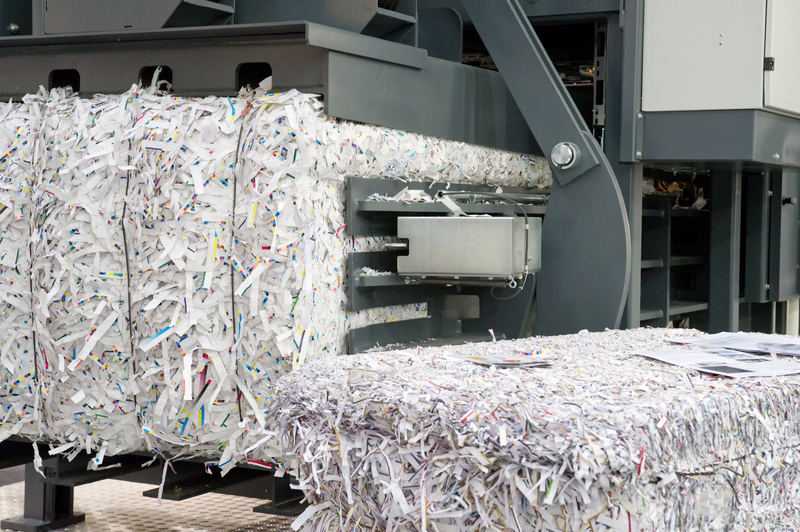From DIY to Garden Waste, Rubbish Removal Bags Offer a Smarter Skip Solution
Rubbish and waste disposal can be a daunting task for homeowners and businesses alike. Whether you're embarking on a home improvement project, managing a garden clear-out, or dealing with accumulated household junk, efficient waste removal is crucial for both the environment and your peace of mind. Traditionally, hiring a skip was the go-to solution for bulk rubbish, but rubbish removal bags are fast emerging as a smarter, more flexible option. In this comprehensive guide, we explore how rubbish bags offer a smarter skip alternative, their versatility from DIY waste to garden debris, and why they've become a popular choice for rubbish clearance across the UK and beyond.

What Are Rubbish Removal Bags?
Rubbish removal bags, sometimes called 'skip bags' or 'waste sacks', are large, durable, and flexible bags engineered to collect and remove different types of waste. Made from tough woven polypropylene fabric, these bags can hold impressive volumes of rubbish without tearing, making them highly reliable for both domestic and commercial uses.
- Sizes: Usually available in small, medium, and large sizes, from 1 cubic yard to 4.5 cubic yards and even bigger.
- Weight Capacity: Designed to hold weights ranging from several hundred kilograms up to 1.5 tonnes.
- Types: General waste bags, garden waste bags, builder's bags for hardcore/rubble, and specialist bags for hazardous or recyclable material.
The innovation lies in their simplicity: you order a bag, fill it at your own pace, and arrange for collection once you're done. This level of convenience and flexibility gives rubbish removal bags an edge over traditional skip hire for many types of projects.
Why Choose Rubbish Removal Bags Over Traditional Skips?
Whether you're tackling a kitchen renovation, garden landscaping, or a big house declutter, you've likely considered hiring a skip. However, the rise of skip bags for rubbish removal is changing the waste disposal landscape. Here's why.
1. Flexibility and Convenience
- No Permit Hassles: Skips placed on public roads or pavements often require paid permits and reflective markings. Rubbish bags, however, can be placed on your own property--driveway, garden, or even inside the house--removing permit headaches.
- On Your Schedule: Fill the bag whenever it suits you. There's no pressure to hurry up, unlike skip hire, which usually comes with fixed collection dates and overstay charges.
- Easy Delivery & Collection: Bags come flat-packed and lightweight, delivered by post or picked up at local stores. Collection bookings are often made online or over the phone, arranged around your schedule.
2. Suitable for Tight or Hard-to-Access Spaces
- Skips need significant space for both drop-off and collection, which isn't always available, especially in urban areas.
- Rubbish removal bags can simply be carried into back gardens, through garages, up stairs, or to locations skips just can't reach.
3. Cost-Effectiveness
- Skip hire includes the cost of the container, delivery, collection, permits, and sometimes daily/weekly rental fees.
- With rubbish removal bags, you only pay for what you use. No hidden fees, no extra charges for unfilled capacity.
- Ideal for smaller volumes of waste, often more economical than half-filling a large skip.
4. Eco-Friendly Waste Management
- Reputable bag collection services sort and recycle a significant proportion of waste, reducing landfill.
- Encourages users to segregate materials--some companies offer dedicated bags for garden waste, soil, or hardcore to aid recycling.
From DIY Projects to Garden Clearance: Versatility of Rubbish Removal Bags
One of the standout advantages of rubbish collection bags is their versatility. Here's how these bags are being used in real-world scenarios, from DIY and renovations to garden waste and decluttering:
1. DIY Home Renovations and Improvements
- Perfect for disposing of old plasterboard, tiles, flooring, kitchen units, and bathroom suites.
- Standard bags can hold drywall, wood, plastic, non-hazardous general waste, and most other household building materials.
- Heavy-duty builder's rubble bags can take bricks, rubble, concrete, and even soil (within weight limits).
2. Garden Waste Clearance
- Dedicated garden waste bags are ideal for grass cuttings, branches, weeds, leaves, hedge clippings, and small logs.
- Multiple sizes mean you can choose the right bag for autumn clear-outs or full landscaping projects.
- Many waste companies offer green waste recycling for bagged garden waste, ensuring your cuttings become compost or mulch rather than landfill fodder.
3. Domestic & Household Clearances
- Sort easily as you declutter--use one bag for mixed household waste, another for recyclables.
- Effortlessly collect small furniture, old toys, textiles, and accumulated junk in bedrooms, garages, or lofts.
- Bag can remain on site for weeks, offering flexibility for slow-paced declutters.
4. Office & Commercial Waste Removal
- Ideal for office renovations, clear-outs, and small commercial refurbishments.
- Bags for electronics (e-waste), paper, and mixed commercial waste are often available.
- With minimal disruption, you keep workspaces clear without the eyesore or inconvenience of a roadside skip.
How Do Rubbish Removal Bags Work? Step-by-Step
Not sure how the process works? Here's an easy breakdown of using rubbish removal bags for smart, stress-free skip bag waste removal:
- Order Your Bag: Choose the size/type you need--many providers offer online ordering and home delivery.
- Set Up Your Bag: Open it up and position it where you want to fill, preferably as accessible as possible for collection (front drive or garden ideal).
- Fill at Your Pace: Add your waste as your project progresses. There's no rush or daily hire fee pressure.
- Arrange Collection: Once you're done, book a collection online or by phone. Some companies offer same-day or next-day pick-up.
- Collection and Disposal: A lorry equipped with a crane will lift the full bag and take it to a local waste transfer or recycling centre.
- Sustainable Disposal: Waste is sorted, recycled, or disposed of according to environmental best practices.
Important Tips:
- Never overfill or exceed the weight limit--collections may be refused and extra charges may apply.
- Only put allowed materials in each bag--hazardous waste must be dealt with separately.
- Always check with your local provider about specific restrictions or requirements.
Comparing Rubbish Removal Bags and Skips: Which Is Best for You?
Both options have their place, but when comparing skips and rubbish removal bags, it's important to weigh up the following:
- Size of Job: For large-scale demolition or bulky, heavy waste, a conventional skip may still be the best option. For most household jobs, skip bags suffice.
- Location: If you have easy access and room for a skip, that's great--but in tight urban streets, or behind the house, bags are unbeatable.
- Cost and Budget: Bag removal is usually cheaper for moderate amounts of rubbish. Only pay for what you actually need.
- Speed and Flexibility: Bags let you work on your own timetable. There's no pressure to fill up quickly or return the container within a tight window.
- Environmental Impact: Skip bag providers often make recycling and responsible disposal a priority.
Top Benefits of Using Rubbish Removal Bags
- Space-Saving: Arrive flat-packed, store easily until they're needed, and take up minimal space unlike skips which must remain in driveway or on the road.
- No Damage to Property: Skips can crack driveways or block access, while bags are lightweight and have no hard edges.
- Simple and Convenient: Order, fill, and collect--all without the administrative hassle of permitting or arranging large vehicle access.
- More Discreet: Skips on the street can become unsightly or attract fly-tipping. Bags are less conspicuous and only need to be placed outside for collection.
- Encourage Responsible Disposal: Many providers operate with a focus on limiting landfill and maximising recycling.
What Types of Waste Can Be Disposed Of?
Rubbish removal and skip bags can take a broad range of non-hazardous waste types. Here are some examples:
- DIY & Construction Waste: Plasterboard, bricks, tiles, wood, scrap metal, plastic pipes
- General Household Waste: Furniture, electricals, old carpets, toys, bags of rubbish
- Garden Waste: Grass cuttings, branches, hedge trimmings, leaves, small logs
- Recyclables: Cardboard, plastics, glass, and clean paper
- Soil & Rubble: Specialist builder's bags can usually take soil, aggregate, concrete, sand, and stone (check provider rules)
Prohibited items typically include asbestos, paints/solvents, chemicals, gas bottles, medical waste, and large electrical appliances like fridges. Always consult the bag provider's specific waste list to avoid surcharges or rejections.
Environmental Impact: A Sustainable Skip Alternative?
One of the best features of skip bags for rubbish removal is their role in eco-friendly waste management. Because collections are scheduled and bag contents separated ahead of time, waste companies can sort more carefully than with mixed skip loads.
- Many providers publish recycling rates, with up to 90% of waste diverted from landfill in some cases.
- Using dedicated garden waste bags or separate sacks for rubble, plastics, or metals further increases recycling efficiency.
By opting for rubbish removal bags over conventional skips, you support more targeted and environmentally responsible waste processing.
Frequently Asked Questions (FAQs) About Rubbish Removal Bags
Are skip bags strong enough for heavy or sharp waste?
Yes, most skip-style rubbish removal bags are made from reinforced woven polypropylene and designed for high weights (1000kg+), including hardcore, rubble, and other building materials. Ensure you follow the manufacturer's weight guidance.
How much does rubbish removal bag collection cost?
Fees can range from ?30 for a mini bag to ?200+ for extra-large bags collected in expensive urban areas. The total cost depends on the bag size, collection location, and waste type.
Can bags be collected from anywhere?
Providers generally request the bag be accessible for crane lorry collection (e.g., on driveway or within 4 metres of the roadside). Hard-to-reach spots may incur extra fees or require special arrangements.
How do I know which bag size I need?
Small bags (1 yard) are suited for light declutters and garden jobs. Medium bags (1.5-2 yards) are popular for room clear-outs or kitchen refits. Large/jumbo bags (3+ yards) suit bigger refurbishments or multi-room waste.

Conclusion: Why Rubbish Removal Bags Are The Smart Skip Solution
From DIY projects to ongoing garden trims, rubbish removal bags have revolutionised the way we handle unwanted waste. Skip bags are simple, flexible, cost effective and widely accessible. They eliminate the hassle of permits and scheduling, offering smarter and more sustainable alternatives to conventional skip hire for most domestic and business requirements.
Next time you're planning a renovation, landscaping, or are just overwhelmed with clutter, consider the advantages of rubbish removal bags. Their environmental benefits, ease of use, and adaptability mean you'll clear your space--and your conscience--in no time.
Ready To Try Rubbish Removal Bags?
Order your first skip bag and discover why so many homeowners, gardeners, and businesses are switching to this modern alternative. For rubbish removal that's truly smart, flexible, and environmentally friendly, rubbish removal bags are clearly the future of waste disposal.
- Say goodbye to skip logistics and permit woes
- Work at your own pace and schedule collections as needed
- Support local recycling and greener waste outcomes
Make rubbish removal easy, effective, and efficient! From DIY to garden waste, rubbish removal bags offer a smarter skip solution every time.
